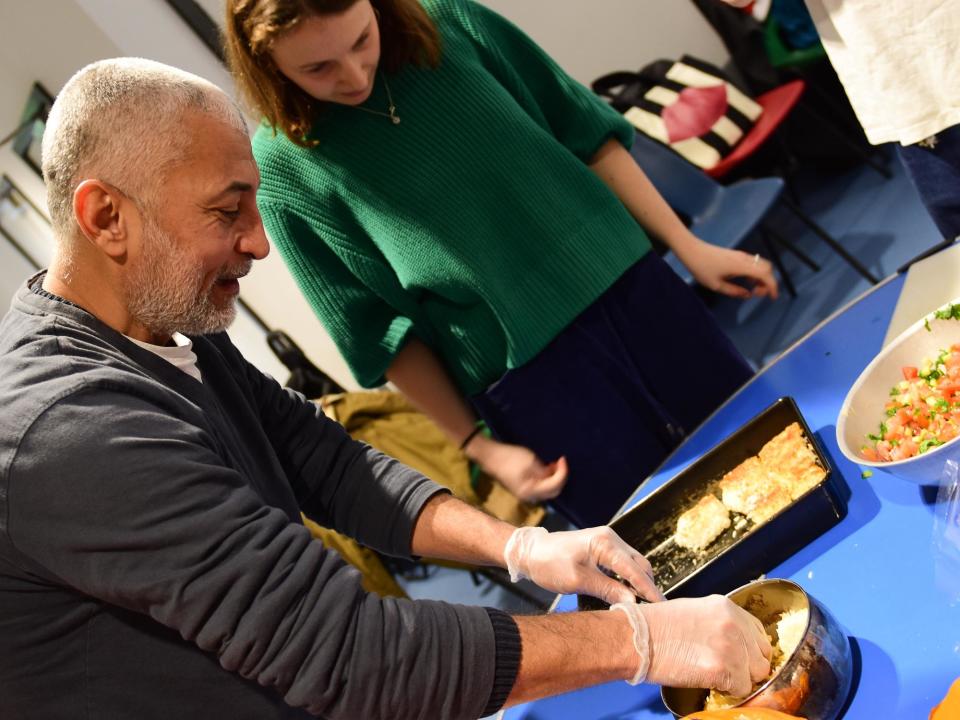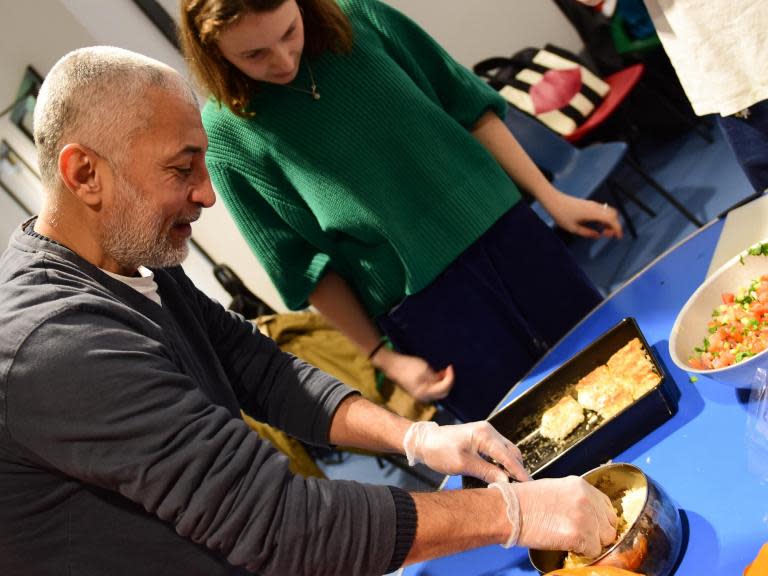The refugees giving a whole new meaning to ‘food for thought’
Osman watches 20 golden falafel fry in a pan of simmering oil. He is using a recipe taught to him by his mother, more than four decades ago and thousands of miles away in Egypt. Now, he’s in a community centre kitchen in south London. “Ninety per cent of Egyptians eat falafel in the morning,” he says. “I made it with my hands, not a machine. It’s different to the Lebanese falafel, it’s green not yellow – because of something special, it’s a secret.’ (A quick Google search suggests the “something special” is more coriander.)
The 53-year-old was raised on a farm outside Cairo, growing fruit and vegetables. “I left school when I was 10 years old and started working to help with everything on the farm, and sometimes in the house,” he says. “I have one brother, who’s a doctor now, and two sisters.”
Osman’s family is still in Egypt. He has a 24-year-old son who is due to qualify as a doctor this year, and a 14-year-old daughter who lives with his ex-wife. In Cairo he had his own business, exporting goods. But when he came to the UK in 2015, initially to resolve a business dispute over payment for containers of grapes, he knew no one. He had never been to Britain before.

When his visa ran out with his case still unresolved, he was told he would have to return to Egypt to apply again. Fearing he’d be rejected and left with no chance of recovering the money he says he is owed, Osman decided to apply for asylum to live in Britain. Then he was left to wait.
There are about 50,000 people in UK awaiting a decision on asylum, according to government figures. Their paths to the UK and reasons for coming are different but, while they wait, most of them face broadly the same treatment. If they need it, they are given housing and financial support of less than £38 a week – about £5 a day. That’s little more than the cost of a return bus ticket.
I just want to show how I can work but I’m not able to – I’m not able to do anything and it’s really hard
Rawa, an African refugee
While the Home Office’s own limit for dealing with cases is six months, statistics from last year show that nearly 15,000 were not dealt with in this time – a rise of 76 per cent on two years ago. Some cases take years. Even when they are dealt with, more than a third of those rejected are overturned on appeal. Campaigners have warned of an “unrealistically high” burden of proof on applicants, requiring them to show evidence of torture and sexual assault. When these figures were released, the Home Office said it had given protection to more than 97,000 people since 2010, and Britain had “a proud history of providing protection to those who need it”.
And while they wait, these people are left in limbo, often living in isolation and unable to work. They have difficulty accessing basic services, such as English language lessons to help them integrate, and there is usually no network of support.
Jon Featonby, of the British Red Cross, says the charity sees asylum-seekers at crisis points throughout the process. “The first thing they have to do is work out how to apply for asylum in person on entry,” he says. “Then when they are entering the support system, they won’t have any money. They apply for financial support from the Home Office and the application wait can be tricky at times because, to qualify, you have to prove that you are destitute. Some have been in the country before claiming asylum staying with friends. Quite often they’re asked, ‘Why can’t you continue to stay with them?’”
He says that when asylum-seekers do manage to apply, they don’t get any choice in their interim living arrangements. “People get sent all over the UK, mostly outside the southeast because housing there is so expensive,” he explains. “That accommodation isn’t always great in terms of quality. They don’t know people and might not have a community to support them.”
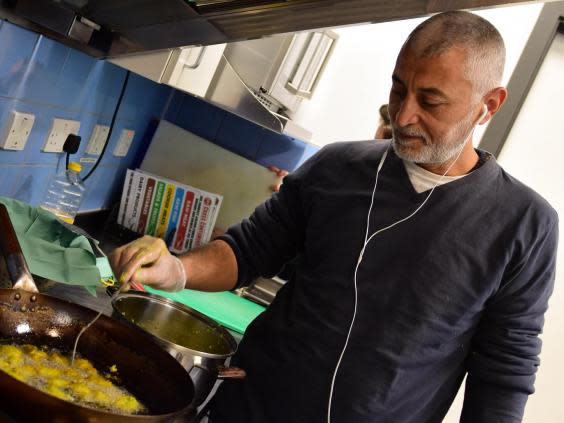
Jon says these asylum-seekers want to get on with their lives and contribute, and being unable to do so can affect their mental health. “We see people wait years for a decision,” he adds. “It should be six months but in the last two years we have seen more and more taking longer, so people are living in limbo for longer, so they are unable to work.
“People come to the UK for different reasons and don’t know what to expect. They don’t understand what the system is like and what the impact can be. Even if people want to study, there are limitations on that. It’s hard to get English language lessons living in isolated places. Organisations like ours do the best they can but there is only so much we can do.”
For Osman, the answer was to get involved with Migrateful, a social enterprise that helps migrants hold their own cookery classes across London. He teaches people how to make Egyptian food and, once a week, the chefs – from across Africa, the Middle East, eastern Europe and South America – meet to teach each other their recipes and practise English. It brings them together with people in similar situations, but also improves their language and leadership skills. Jon says groups like this can give people structure and links to others when they’re living in isolation.
That’s what brought Osman to this kitchen in south London, making falafel for the other chefs and volunteers to try.
“Before I came here, to Migrateful, I only stayed at home,” Osman says. “I had no friends or family with me. Now I talk to people, it’s much better. I’ve learnt many different dishes, we’re sharing. Making falafel reminds me of home. I do falafel at my classes too. For me it’s easy to make but not for everyone – it’s hard to get just right.” Now Osman waits for a decision to be made so that, after four years, he can get on with his life. His plan is to start his own business, opening a shop. He wants to sell falafel.
* * *
Rawa, 27, has a kitchen full of vegans awaiting her instructions. Through Migrateful, they’ve all signed up to be shown how to make several dishes from Rawa’s native Eritrea and, at the end of the night, share what they’ve cooked up. As an Orthodox Catholic, she fasts for 85 days a year in the run-up to Easter. This food for fasting is meat-free, dairy-free and gluten-free, making it perfect for vegans looking to embrace recipes from another culture.
Eritrea is a dictatorship under Isaias Afwerki, who has ruled the northeast African nation since 1993. There is no press freedom, no independent judiciary, and no freedom of religion. Some Eritreans face arbitrary imprisonment and even torture. Estimates say 12 per cent of the population has fled the oppressive regime. According to Human Rights Watch, there is no sign of an end to the “severe repression of basic rights”.
Rawa came to Britain in 2008 and was forced to sleep rough. With help from the Red Cross and Shelter, she was able to find somewhere to live, sharing housing with other Eritreans. “When I came to the country I didn’t know how to cook, but I’d seen my mum cooking,” she says. “I lived with people from Eritrea and didn’t know how – so they made me and now I know how. I found Migrateful and it’s really nice to cook with people and eat with people. Now every week we come together and it reminds me of my country. Eating together is a big part of my country and it’s really nice, it takes me back. It’s really nice having people to learn from.”
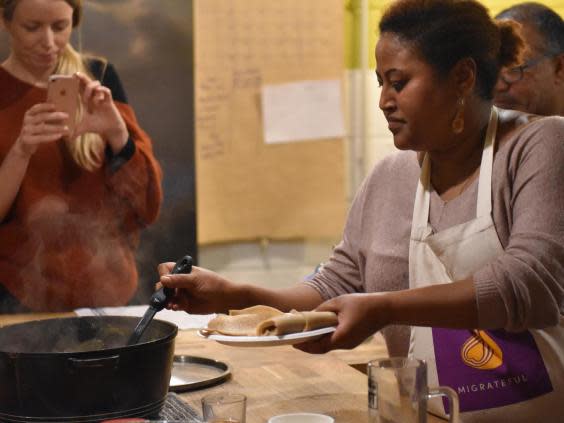
So it is that Rawa, from one of the world’s most secretive states, is passing on recipes handed down through families in Eritrea. She takes them through alicha, a potato and carrot stew, and a green cabbage dish called gomen. After telling the group about each of the recipes, Rawa sets them off preparing the food, moving between the groups to make sure everything is diced and stirred just right. Some of the ingredients are traditional, while others – such as four jars of Colman’s mustard for the lentil stew azifa – aren’t. But all dishes are eaten with injera, a giant sourdough flatbread.
Rawa has been in Britain for 11 years – and she is still waiting for her status to be settled. As she shares her dishes with the class, she says what she wants most of all is to be able to get a job.
“I just want to show how I can work, but I’m not able to,” she says. “I’m not able to do anything and it’s really hard to sit without doing anything because they won’t let you. At least [now] I can show my culture. It’s just about being able to go from the house and show that I’m doing something. The first time I was teaching I was so scared, but it’s good now, it’s easy. I feel like I’m doing something.”
But while she waits for a decision on her asylum status, Rawa doesn’t have a legal right to work.
According to a report by charity Refugee Action, allowing asylum-seekers to work would generate £42.4m for the government through taxes and savings.
Some 94 per cent of asylum-seekers the charity spoke to said they wanted to work, and the majority of the public would also back the move. But asylum-seekers are allowed to apply for permission to seek employment only after they have been waiting at least 12 months for a decision. Even then, they are only allowed to work in certain industries.
Groups across the country are backing the Lift The Ban campaign, with several bills put forward in parliament to reduce the time limit and restrictions. They want those whose cases have been pending for six months to be given the right to work. Home secretary Sajid Javid told the Commons in December it is an area he would like to review.
Paul Hook, from Refugee Action, says: “Everyone knows how important it is to work – to feel valued, to use your skills and experience, to earn a living to support yourself and your loved ones. By banning people seeking asylum from working, the UK government instead condemns thousands of people to live in poverty, forcing them to rely on the £5.39 a day.
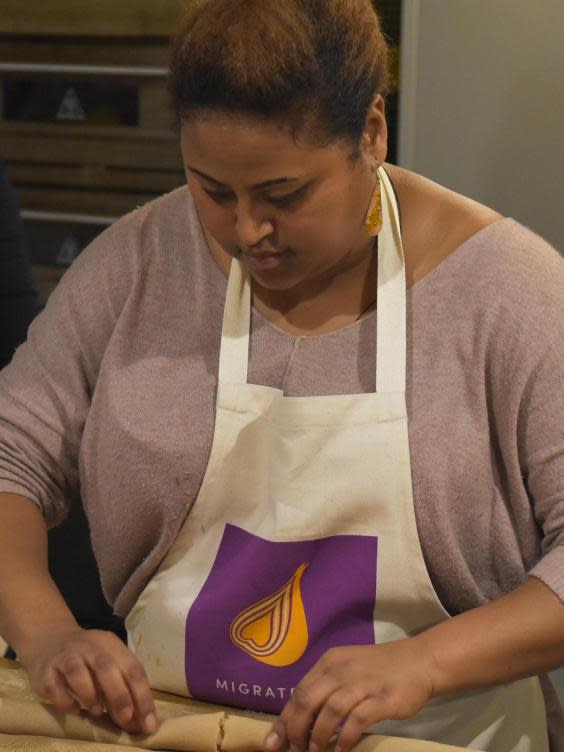
“The Lift The Ban campaign is backed by a coalition of over 140 businesses, trade unions, charities and faith groups; and has strong public support and cross-party support in parliament. We believe it’s high time ministers change the rules and give people seeking asylum the right to work six months after they make their claim for asylum so that they can use their skills, earn a decent living, start to integrate into their local communities, and rebuild their lives.”
But for now, the ban remains in place, and Rawa is still waiting. “When you get papers your life starts all over again,” she says. “If people were able to work, they could show what they can do.”

 Yahoo News
Yahoo News 